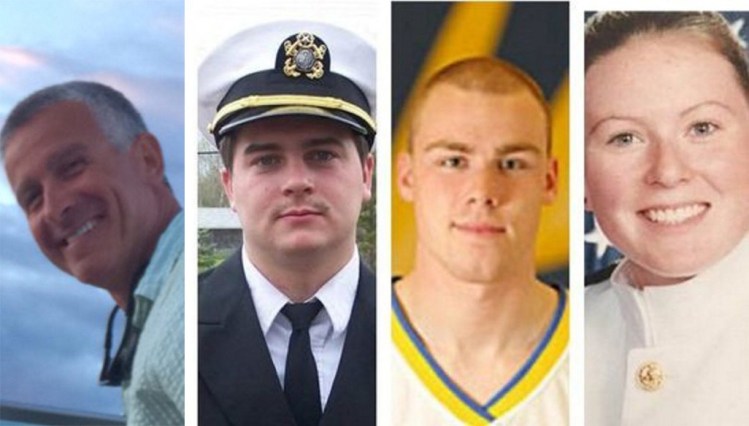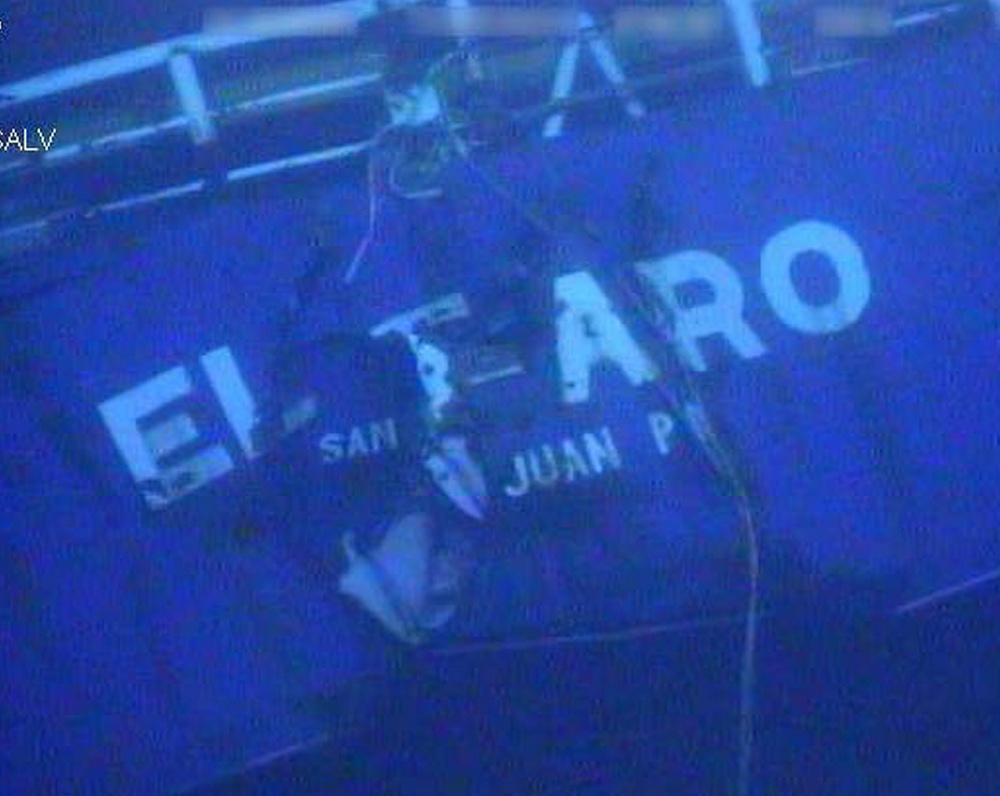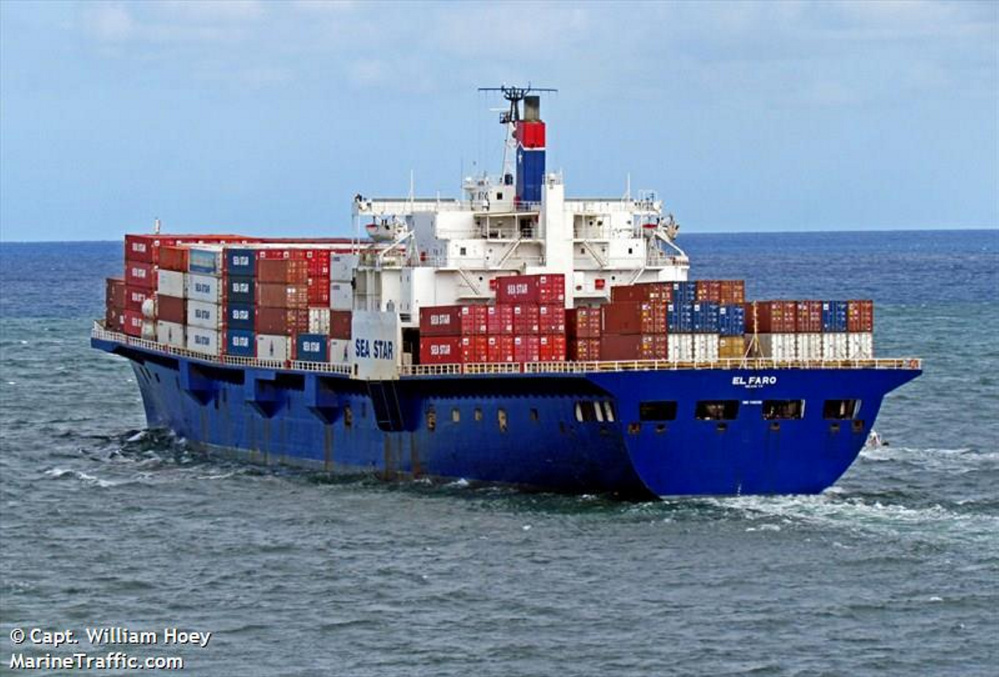Everywhere investigators looked, there were failures. Failures in inspections. Failures in maintenance of the vessel. Failures in communication.
In many ways, the cargo ship El Faro was doomed when it sailed from Jacksonville, Florida, more than two years ago, directly into the path of Hurricane Joaquin.
All 33 people on board were killed when the ship sank, including four from Maine, in the worst U.S. maritime tragedy in more than three decades.
During the National Transportation Safety Board’s daylong hearing Tuesday – the latest and final in the investigation into the tragedy – officials said the probable cause was multifaceted, but rested largely with the ship’s captain.
Just as the Coast Guard concluded two months ago, the NTSB agreed that Capt. Michael Davidson of Windham made decisions that contributed to the ship’s sinking, including failing to listen to other crew members’ concerns. The structural integrity of the 40-year-old ship also played a major role, as did a lack of oversight by the company that owned the vessel, TOTE Maritime, and outdated weather information about the Category 3 hurricane.
Also, had crew members been able to launch their safety boats – they couldn’t because of the listing of the ship and extreme weather – they likely still would not have survived because the boats were open lifeboats, not closed. Although legal, the ship’s use of the older-style boats was allowed only because of an exemption to safety rules for older ships such as the El Faro.
The NTSB findings, roughly 80 in total, led to 53 draft recommendations that the board hopes will improve maritime safety and prevent a future tragedy, said Chairman Robert Sumwalt.
“This draft report is more than 400 double-spaced pages, which makes it the longest report I’ve seen in my 11 years at the board, and the investigative staff made every word count,” he said. “This report will be studied by mariners young and old for many years, and I’m confident that this tragedy at sea, and the lessons from this investigation, will help improve safety for future generations of mariners.”
Those recommendations include establishing better communication protocol among crew members, requiring stricter safety inspections, mandating closed lifeboats and developing damage control plans. The NTSB also recommended that all mariners carry personal locator beacons to make it easier to find them during marine emergencies.
VOYAGE IS WELL-DOCUMENTED
The final voyage of El Faro has been well-documented by now. The 790-foot ship, loaded with cargo containers and vehicles, departed Florida for San Juan, Puerto Rico, on Sept. 29, 2015, and sank two days later off the coast of the Bahamas.
The crew, led by Capt. Davidson, was aware of Hurricane Joaquin and planned to alter the ship’s route slightly to travel around the storm’s path. But at some point, the hurricane’s path shifted and the ship’s crew members were not aware of that in time because they were relying on hours-old weather information.
Davidson, as the ship’s master, had several opportunities to turn the ship around but didn’t. Large cargo ships travel in inclement weather, including hurricanes, on a regular basis and he told crew members in the hours leading up to the sinking that the ship would be able to handle the hurricane.
Much of what has been revealed about the final 24 hours of El Faro was contained in the ship’s voyage data recorder, which was recovered from the ocean floor last August after a 10-month effort that cost roughly $3 million.
The data recorder included audio from the vessel’s bridge. That audio has not been released publicly, but the NTSB and Coast Guard turned it into a transcript, which was released last December. Much of it, especially the final couple of hours before the ship went down, is harrowing.
At 7:29 on the morning of Oct. 1, Davidson made the call to abandon ship. Ten minutes later, the audio cut out. The last voices heard were Davidson and a crew member struggling to escape the rapidly submerging vessel.
Of the 33 who were killed, 28 were Americans. The other five were from Poland.
Four crew members were from Maine, including Davidson, 53; Michael Holland, 25, of Wilton; and Danielle Randolph, 34, and Dylan Meklin, 23, both of Rockland. All four were graduates of Maine Maritime Academy in Castine, as was a fifth crew member, Mitchell Kuflik of New York.
Holland’s mother, Deb Roberts, told the Portland Press Herald in October that the Coast Guard went over the report in detail with the victims’ family members before releasing it to the public. Roberts said the key takeaway for her was that no single person or entity was solely responsible for the tragedy.
“There were times that the crew didn’t have accurate information that could have made a difference,” she said. “There were things early on, even before the accident, that the Coast Guard could have done differently. There wasn’t any one thing – it was several factors, sometimes seemingly small, that caused the tragedy to happen.”
HUMAN FACTORS CONTRIBUTE
Carrie Bell, a member of the NTSB investigative team, outlined on Tuesday the ways in which human factors contributed to the tragedy. Her remarks focused largely on Davidson, who she said failed to gather crew to discuss any concerns about the hurricane, failed to return to the bridge even as weather worsened and failed to listen to crew members who did express concerns.
Bell said Davidson was a 24-year maritime veteran who had sailed in bad weather on numerous occasions, although it was clarified that his experience was not with that type of cargo ship and not as a ship’s master. She also noted that some within the company had “dwindling confidence” in his leadership. One employee, in an email, referred to Davidson as a “stateroom captain,” implying that he spent more time in his own room than on the ship’s bridge.
However, during Tuesday’s hearing, NTSB members added another finding: that had crew members more effectively stated their concerns, the captain’s situational awareness might have been improved.
Blame also was levied at the ship’s owner, TOTE Maritime, which owns several other cargo ships. The NTSB concurred with the Coast Guard that TOTE violated safety regulations to ensure the crew was well rested, and that the company had not replaced a safety officer management position. TOTE also had stopped employing port helpers who assist in safely loading cargo on ships.
The Coast Guard also found that El Faro’s crew had difficulty keeping up with the brisk loading pace required to keep the ship on schedule. Cargo shipping is a high-pressure industry in which containing costs are imperative.
Larry Brennan, a professor of maritime law at Fordham Law School and a retired U.S. Navy captain, said the NTSB’s findings could create a safer working environment for mariners in the future. For example, the board could help by calling for the removal of the safety exemption that allowed the El Faro to legally use old lifeboats.
“No one should use open boats in rough weather, or any weather,” Brennan told the Associated Press. “If the NTSB takes an aggressive course, they may be able to effectively change regulations and policies that will enhance safety at sea.”
Eric Russell can be contacted at 791-6344 or at:
Twitter: PPHEricRussell
Send questions/comments to the editors.






Success. Please wait for the page to reload. If the page does not reload within 5 seconds, please refresh the page.
Enter your email and password to access comments.
Hi, to comment on stories you must . This profile is in addition to your subscription and website login.
Already have a commenting profile? .
Invalid username/password.
Please check your email to confirm and complete your registration.
Only subscribers are eligible to post comments. Please subscribe or login first for digital access. Here’s why.
Use the form below to reset your password. When you've submitted your account email, we will send an email with a reset code.